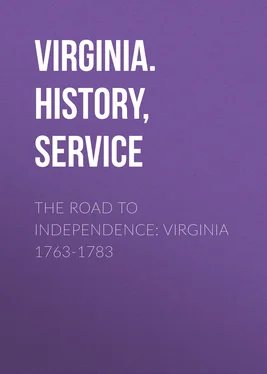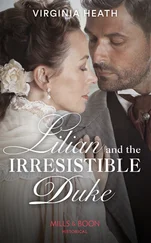Virginia. History, Government, and Geography - The Road to Independence - Virginia 1763-1783
Здесь есть возможность читать онлайн «Virginia. History, Government, and Geography - The Road to Independence - Virginia 1763-1783» — ознакомительный отрывок электронной книги совершенно бесплатно, а после прочтения отрывка купить полную версию. В некоторых случаях можно слушать аудио, скачать через торрент в формате fb2 и присутствует краткое содержание. Жанр: foreign_prose, История, foreign_edu, foreign_antique, на английском языке. Описание произведения, (предисловие) а так же отзывы посетителей доступны на портале библиотеки ЛибКат.
- Название:The Road to Independence: Virginia 1763-1783
- Автор:
- Жанр:
- Год:неизвестен
- ISBN:нет данных
- Рейтинг книги:4 / 5. Голосов: 1
-
Избранное:Добавить в избранное
- Отзывы:
-
Ваша оценка:
- 80
- 1
- 2
- 3
- 4
- 5
The Road to Independence: Virginia 1763-1783: краткое содержание, описание и аннотация
Предлагаем к чтению аннотацию, описание, краткое содержание или предисловие (зависит от того, что написал сам автор книги «The Road to Independence: Virginia 1763-1783»). Если вы не нашли необходимую информацию о книге — напишите в комментариях, мы постараемся отыскать её.
The Road to Independence: Virginia 1763-1783 — читать онлайн ознакомительный отрывок
Ниже представлен текст книги, разбитый по страницам. Система сохранения места последней прочитанной страницы, позволяет с удобством читать онлайн бесплатно книгу «The Road to Independence: Virginia 1763-1783», без необходимости каждый раз заново искать на чём Вы остановились. Поставьте закладку, и сможете в любой момент перейти на страницу, на которой закончили чтение.
Интервал:
Закладка:
The key to the political sagacity of these revolutionary Virginians is found in the willingness of an elite group of planter gentry to serve government and to serve it well and in the acceptance of their leadership by the rest of the Virginians. It is found in the enlightened attitudes these leaders had about their responsibilities as officeholders to the people. It is found in the day-to-day operations of government in the county and the General Assembly not just in the great crises of the Stamp Act, the Coercive Acts, and Lexington and Concord. Liberty and freedom do not spring full-blown into life only in times of trial, they are nurtured carefully and often unknowingly over the years. They demand, as Jefferson said, "eternal vigilance". Certainly, liberty and freedom were not allowed to atrophy and become weak in colonial Virginia. Instead, it was the English who had not been vigilant and who had allowed a particularly strong concept of liberty to grow strong in Virginians.
How could a planter elite become the fount of republicanism. 4 4 See D. Alan Williams, "The Virginia Gentry and the Democratic Myth", Main Problems in American History , 3rd. ed. (Dorsey Press, Homewood, Illinois, 1971), 22-36.
First, the common bond of land and tobacco farming gave the large and small planters similar economic interests and a homogeneous society, at least east of the Blue Ridge Mountains. Second, the less-affluent farmer naturally elected his more prosperous neighbors to the House of Burgesses. The poorly run plantation was no recommendation for a public office whose main responsibility was promoting agricultural prosperity. Third, the hard-working small farmers lacked the time and money to serve in public office. Virginia had a long tradition of voluntary service in local government and only a small per diem allowance for attending the House of Burgesses. Finally, social mobility was fairly fluid in a fast-growing society, and the standard of living among the lower classes had improved visibly in pre-Revolutionary Virginia. The independent farmers and small slaveholders saw no reason to oust or destroy the power of the larger planters. They wanted to emulate them and they fully expected to be able to do so.
The liberal humanism of the planter gentry did much to assure the people that they had little to fear from their "betters". The gentry served because they believed in noblesse oblige—with power and privilege went responsibility. Honor, duty, and devotion to public and class interest called them to office, and they took that call seriously. They alone had the time, the financial resources, and the education necessary for public office. As social leaders they were expected to set an example in manners and public morals, to uphold the church, to be generous with benevolences, to serve with enlightened self-interest, and to be paragons of duty and dignity. With a certain amount of condescension and considerable truth, they thought colonial Virginia would be ill-served if they refused to lead and government was run by those who were less qualified to hold office. They set a standard which has remained the benchmark of Virginia political ethics.
Though they remembered their own interests, the burgesses believed they were bound to respect and protect those of others. This was a fundamental part of Virginia public ethics and was one reason for the absence of extensive political corruption. They held that sovereignty was vested in the people, who delegated certain powers to government. This they believed long before the Revolution. As early as 1736 Sir John Randolph reminded the burgesses:
We must consider ourselves chosen by all the People; sent hither to represent them, to give their Consent in the weightiest of their Concerns; and to bind them by Laws which may advance their Common Good. Herein they trust you with all that they have, place the greatest Confidence in your Wisdoms and Discretions, and testify the highest Opinion of your virtue. 5 5 Journal of House of Burgesses, 5 August 1736.
When Randolph made these remarks, he was telling the burgesses what they already knew and at a time when there were no pressing public issues. It was this abiding interrelationship between electorate and representatives which was the strength of the Virginia political system. The gentry extolled republicanism not only because it seemed the right and just attitude but also because it worked.
The small farmers and slaveholders acted as a restraint upon any tendency toward oligarchy which the gentry might have entertained. The small farmers were in the majority and they had the right to vote. The percentage of white males who voted in the 18th Century elections was quite high. True, the colonial voters elected only the burgesses, but that single choice was an important guarantee of their rights, since the House of Burgesses was the strongest political body in Virginia. Thomas Jefferson once remarked that the election process itself tended to eliminate class conflicts and extremism: the planter aristocrat with no concern for the small farmer was not apt to be elected, and the man who demagogically courted the popular vote was ostracized by the gentry. Therefore, the House of Burgesses became, at the same time, the center of planter rule and of popular government. 6 6 For a short well-written discussion of the election process see Charles S. Sydnor, Gentlemen Freeholders: Political Practices in Washington's Virginia (University of North Carolina, 1952, reprinted in paperback as Revolutionaries in the Making: Political Practices in Washington's Virginia .
The constitutional philosophy of the House of Burgesses proclaimed in response to the Grenville revenue program in 1764 was not new. When Patrick Henry electrified the burgesses with his Stamp Act Resolves in May 1765, he was not setting forth a new concept of government, he was reaffirming, in a most dramatic form, constitutional positions the burgesses themselves well understood. The burgesses had developed their constitutional positions during the 1750's in response to a series of minor, isolated events—royal disallowance, the Pistole Fee Controversy, and the Two-Penny Act.
After trying for years to codify and reform laws long in use, the General Assembly in 1748 completed a general revision of the laws. Included in these revisions were several laws already in force and approved by the crown. The assembly did not include a suspending clause with these acts, (holding up their implementation until the crown had an opportunity to approve them). While a suspending clause was supposed to be attached, the assembly had not done so regularly for years and the governors had not challenged them, nor had the crown complained. In 1752, however, the crown disallowed half-a-dozen laws, claiming the assembly had intruded upon the king's rights and ignored the governor's instructions. Angered, the assembly protested this "new" behavior by the crown and asserted they could not remember when the king had vetoed laws which were of no consequence to the crown, nor contrary to parliamentary law, but which were of importance to Virginia. It was the beginning of a long struggle.
In 1752 there also occurred a second and more decisive dispute—the Pistole Fee Controversy. One of the frequently overlooked events in Virginia, this debate between the royal governor and the House of Burgesses brought forth the classic constitutional defense by the house of its right, and its right alone, to tax Virginians. The burgesses' powers, as proclaimed by Richard Bland, became the fundamental argument by Virginians against royal encroachment upon what they believed were their rights.
Shortly after his arrival in Virginia Governor Robert Dinwiddie announced his intention to charge one pistole (a Spanish coin worth about $3.50) for applying the governor's seal to all land grants. The council, believing this was a routine fee for a service rendered, concurred. The storm of protest which followed amazed Dinwiddie. The burgesses accused Dinwiddie of usurping a right not his in order to line his pockets. This was not a fee, it was a tax, and only the burgesses could initiate a tax on Virginians. Dinwiddie denied that the fee was solely for his personal remuneration. Instead, he maintained his aim was to return to the tax rolls millions of acres of land withheld by Virginians in order to prevent collection of the annual quit-rent on the land which every Virginia landowner paid the crown. In the heated debates which followed, both parties built their cases around the rights and privileges each claimed was its own. The ultimate outcome, which resulted in a compromise by the crown, satisfactory to both Dinwiddie and the burgesses, is not as important as the constitutional argument put forth by the burgesses.
Читать дальшеИнтервал:
Закладка:
Похожие книги на «The Road to Independence: Virginia 1763-1783»
Представляем Вашему вниманию похожие книги на «The Road to Independence: Virginia 1763-1783» списком для выбора. Мы отобрали схожую по названию и смыслу литературу в надежде предоставить читателям больше вариантов отыскать новые, интересные, ещё непрочитанные произведения.
Обсуждение, отзывы о книге «The Road to Independence: Virginia 1763-1783» и просто собственные мнения читателей. Оставьте ваши комментарии, напишите, что Вы думаете о произведении, его смысле или главных героях. Укажите что конкретно понравилось, а что нет, и почему Вы так считаете.












